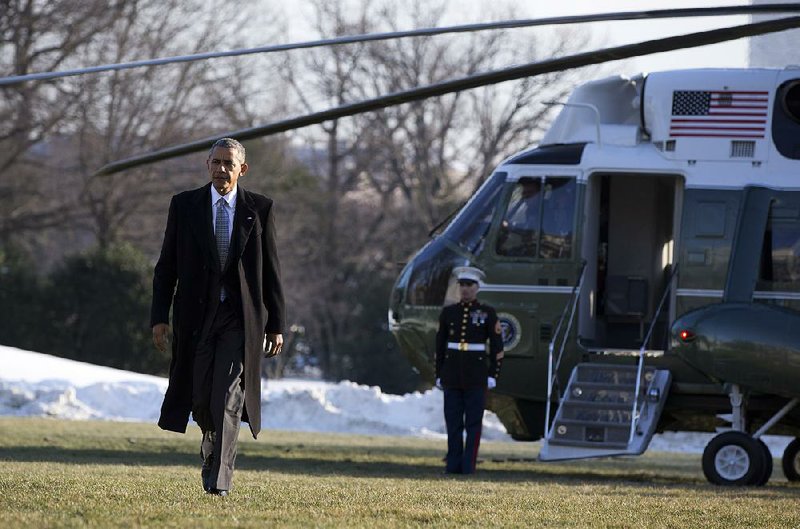WASHINGTON -- President Barack Obama is expected to pitch some new proposals to expand access to retirement savings accounts and revisit some old ones when issuing his budget next month.
Many Americans are not well-prepared for retirement, with only one in three having any savings or pensions available for their later years, according to a Federal Reserve report.
The White House said Obama's proposals, if enacted, would provide more than 30 million people with access to a retirement account by allowing small businesses to more easily pool 401(k) plans.
The proposal is to be included in his 2017 budget.
Obama also will propose making it easier for job-hopping workers to track multiple retirement accounts and combine them, and he'll ask Congress to provide $100 million to test new, more portable accounts. His budget is to be released Feb. 9.
Help for the biggest chunk of those 30 million people would occur through legislation requiring employers that don't offer retirement plans to automatically enroll their workers in Individual Retirement Accounts. The employers that did so would get a tax credit of $3,000 to help them offset the administrative expense. The proposal was also part of last year's budget, but Congress did not approve it.
On the new front, Labor Secretary Thomas Perez said the administration will seek to make it easier for multiple employers to join together to offer retirement plans. For small employers, that would mean lower administrative expenses.
"We are willing to take steps to make it easier and cheaper for employers to offer a path to dignified retirement," Perez said. "They should be willing to do the right thing and set up more plans so their workers can save."
Perez said current law allows employers with a "commonality," for example a group of auto dealers, to together offer a retirement plan. He said the president will recommend doing away with the "common bond" requirement and let people from all kinds of businesses join together. The White House says it's recommending that Congress pass legislation that would ensure the long-term sustainability of such arrangements.
A few states have recently approved state-run retirement plans for private-sector workers. The Obama administration says it wants to encourage those efforts and will finalize regulations later this year to ensure that the plans don't run afoul of federal pension law.
"Workers without a retirement plan at work rarely save," Jeff Zients, the National Economic Council director, told reporters in a conference call Monday. "We know that economic security in retirement is a kitchen table issue."
Many people even a decade away from retirement haven't saved enough, presenting a looming crisis that Obama is right to address, said Jared Bernstein, a researcher at the nonprofit Center on Budget and Policy Priorities in Washington and a former member of Obama's economics team.
"It's important because an increasing number of people are ill-prepared for the economic challenges they'll face in retirement," Bernstein said in an interview. "The administration, I can tell you as someone who used to work there, has long been aware of the problem."
BlackRock Inc., the world's largest asset manager and a provider of investments to retirement plans, supports the proposal, said Barbara Novick, a vice chairman at the company. Small employers would be able to offer workers a 401(k) at lower cost, Novick said in an email.
"They can pool resources and reduce costs, which creates a positive incentive to adopt plans," she said.
Financial services companies that run and sell investments to the plans, as well as workers who don't have retirement accounts, would benefit "if it's done correctly," said Michael Kreps, an attorney at the Groom Law Group in Washington, which represents employers, pension plans and financial services companies.
"They are recognizing that there's bipartisan support for this, and it's something that could get done in 2016," Kreps, a former Democratic staff member of the Senate Health, Education, Labor and Pensions Committee, said of the White House proposal.
Obama met Tuesday at the White House with the Democratic leaders of the House and Senate, Rep. Nancy Pelosi of California and Sen. Harry Reid of Nevada, to talk about his 2016 legislative agenda. On Thursday, he's to talk with Democratic lawmakers at a retreat in Baltimore.
Last year, Obama created a retirement account called a myRA for people without 401(k) plans. The program doesn't offer matching contributions from employers and doesn't allow for investing in the stock market, but it guarantees that participants won't lose their savings. Savers through the program can invest only in a U.S. Treasury security guaranteed never to lose value.
Information for this article was contributed by Kevin Freking of The Associated Press and Angela Greiling Keane and Margaret Collins of Bloomberg News.
A Section on 01/27/2016
